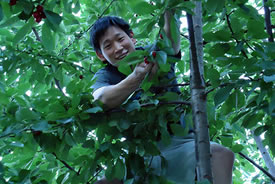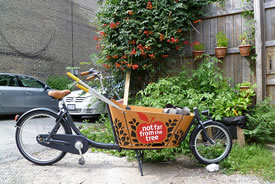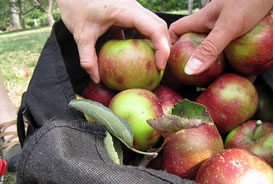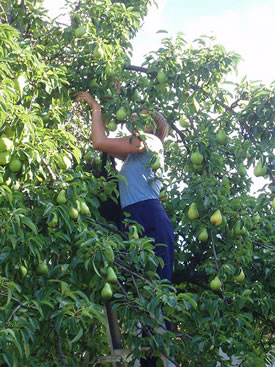Urban farming: Bringing communities back to nature

Cherry picking (Photo by Malgiosa Halliop)
As employees of the Nature Conservancy of Canada (NCC), something we are often encouraged to do is unplug, unwind and spend some time outside, exploring and connecting to the abundant natural spaces we are fortunate enough to have across the country. In a large urban centre like Toronto, this can sometimes require us to think outside the box and learn new ways to get in touch with the nature that can be found right in our own backyard — quite literally! In order to enjoy some time outdoors, I recently headed to Downsview Park to connect with Toronto-based organization Not Far From the Tree at a volunteer recognition event to enjoy a bit of fresh maple syrup tapped straight from the Downsview Park forest — a theme that fit right in with Not Far From the Tree’s mission.

Bicycle (Photo by Not Far From the Tree)
Founded in 2007 by Laura Reinsborough, Not Far From the Tree harnesses the power of community in order to give back to Torontonians using the bounty that is available all around us — fruit trees! By rounding up volunteers to travel around the city by bicycle to pick fresh fruit from the trees that are made accessible by private homeowners, Not Far From the Tree benefits the city of Toronto by donating a portion of picked fruit to food banks, shelters and community kitchens, and aims to build a stronger community and a healthier environment.
Becky Thomas, Not Far From the Tree’s community engagement specialist, says that urban farming initiatives like this benefit the environment by "reducing food waste and tapping into an under-utilized local food source that is available in our own backyard." Ensuring that the harvest from local fruit trees does not go to waste is an important part of reducing our carbon footprint. She explains that when fruit falls from the tree and goes unused, the rotting fruit "creates methane gas, which is one of the most harmful greenhouse gases, and makes a significant contribution to global climate change."

Apples (Photo by Not Far From the Tree)
As well, using locally produced food reduces food transportation costs, both economically and environmentally, and educates and engages community members in the process of growing and harvesting food. "This fosters a greater appreciation for food and for farmers — both urban and rural — who put in the time and energy to feed cities like Toronto," says Thomas.
Along with the many environmental benefits, urban farming projects strengthen communities by connecting strangers to each other as well as to the city they live in and the nature that surrounds them. Lisa, a volunteer with Not Far From the Tree, explains what motivates her to share her time with this organization:
"There's a communal aspect to it. You’re meeting people you otherwise wouldn’t have had a chance to meet." She also loves that it is so hands-on and says, "you can see the impact of what you are contributing. It’s tangible."

Pear picking (Not Far From the Tree)
A sentiment, it seems, that many others share. Not Far From the Tree currently has a volunteer database of 1,321 people, 624 of whom volunteered in some capacity — from blogging, to fruit picking, to event planning — in 2013. Thomas agrees that the communal aspect of the work that they do is a huge draw.
"There is something so empowering about finding and mobilizing resources that exist in our own backyard or neighbourhood," says Thomas. Volunteers and tree owners alike "have the opportunity to explore their neighbourhoods and make new connections. Each time a volunteer drops off a load of fruit to a local family shelter or food bank, knocks on a neighbour’s door to borrow a ladder or enters a backyard oasis to help with a fruit pick, they learn more about the assets and generosity that exist in their own neighbourhood."
Whether you live in a large city or a small town, I encourage you to spend some time outdoors this spring and learn more about how you can get involved in your own community. There are countless ways to make new friends and spend time in nature while contributing to conservation and environmental sustainability in Canada.


